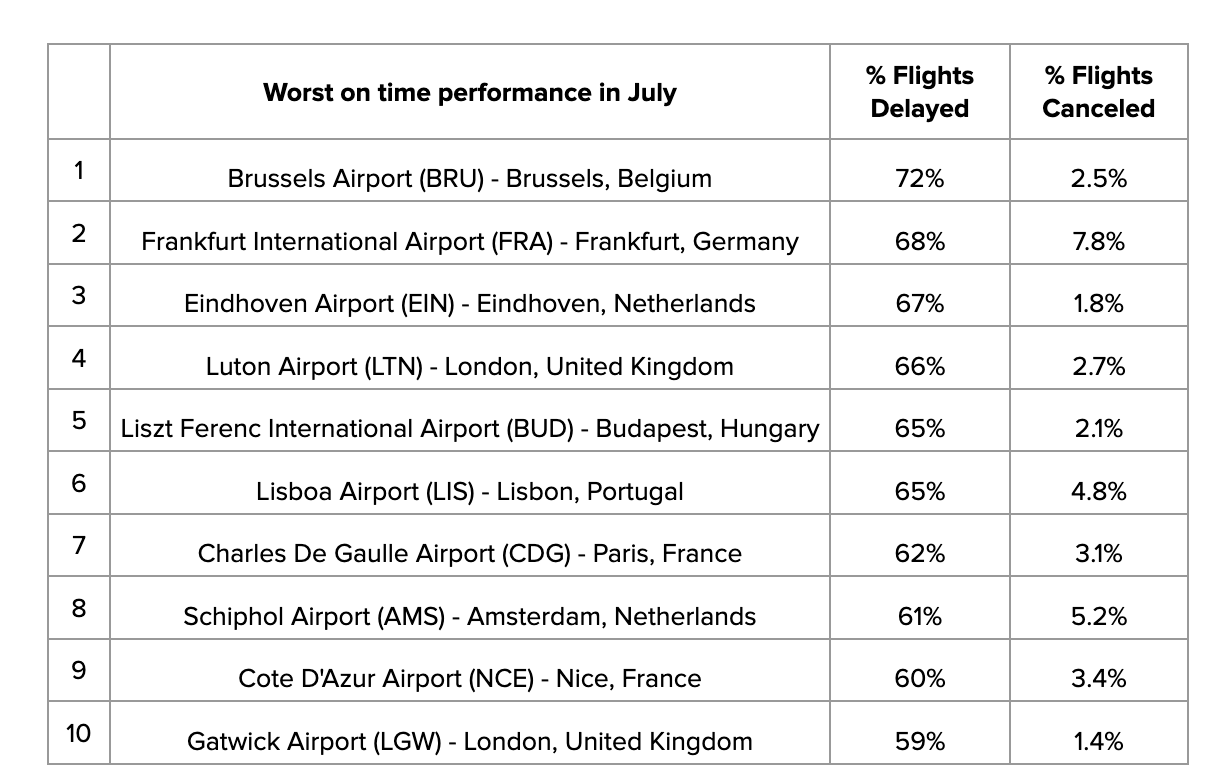After two pandemic summers and the resultant restrictions we’ve all suffered from, including an overabundance of video calls and screen saver landscapes, a shrinking home office, kids learning remotely, wearing slippers all day and having to share your workspace with parakeets, this year’s summer holidays may well have been the most longed-for of the last few decades.
Pretty much all of us dream of travel, of rest and relaxation in far-away Edens, and, of course, planes make up a part of those dreams. Flying “to” and “from” is often a key component in the thrill of a journey.
With itineraries carefully planned, tickets bought, hotels booked, outfits selected — you pack your bags and are ready to go. Finally, the time spent poring over travel agency brochures is at an end. Your expectations will reach their apex. Today’s the day. Let’s go!
Well... Unfortunately, things haven't always gone according to plan this summer.
In June and July this year flight cancellations hit Europe and the United States directly. Many reasons underlie this wave of cancellations.
Airport infrastructure across the world went through significant downsizing as travel was restricted due to covid-19. Adjustments were put in place by airport management companies and changes put in place in terms of how resources for normal ground operations were allocated. Border control also changed with photos of endless queues at Lisbon airport making the news; there just weren't enough people on deck to handle that many passengers.
Obviously, we can't forget the airlines. Strongly impacted by the pandemic, they had to downsize their human resources and their fleets.
It is clear that these organizations suffered as travel pretty much came to a halt, but they did receive massive support to help them through this moment in time. In fact, billions of Euros were doled out to the airlines — no better evidence of support.
You would expect that such backing would have helped them maintain a certain level of service. Even if not to 2019 standards, as clearly recovery does not turn a page as quickly as the sudden dive we all took in March 2020, at the very least you would expect them to scale up their operations as plane tickets began to be sold and hotels started accepting bookings. Data which is freely available from both (inter)national tourist boards and from the IATA (International Air Transport Association).
The expectation was that government support would help maintain installed capacity until the time of recovery because, sooner or later, recovery would come.
Holiday-goers in the northern hemisphere predominantly travel between June and September, and this hasn't changed in the last two years. And you would also reasonably expect that lifting restrictions in March would result in people wanting to go abroad in the summer. You get the impression everyone was on standby, waiting for the indicators posted early 2022 to finally stabilize. And so they did, but there was no time to react, and chaos ensued.

Top 10 airports in Europe with significant passenger volume, with the highest percentage of flights delayed and canceled between July 1st and July 10th 2022. (1)
You get the impression everyone was on standby, waiting for the indicators posted early 2022 to finally stabilize. And so they did, but there was no time to react, and chaos ensued. One example is Lisbon, leading the pack in Europe when it comes to delays and cancellations.
To add further complexity to the situation, numerous unions in the airport and civil aviation segments have maximized the impacts of their strikes, taking action around the holiday period with a view to turning passenger frustration towards their employers which, in many cases happens to be the government — led by parties who live at the mercy of their constituents, who also fly. Of course, this is not news. Everybody already knows this.
To add further complexity to the situation, numerous unions in the airport and civil aviation segments have maximized the impacts of their strikes, taking action around the holiday period with a view to turning passenger frustration towards their employers which, in many cases happens to be the government — led by parties who live at the mercy of their constituents, who also fly. Of course, this is not news. Everybody already knows this.
Airlines saw but a way out of this flaming wreckage: simply remove passengers from the equation. There were simply too many of them crowding the airports with nothing to do, causing a ruckus.
These same passengers of course would have come as a blessing during the pandemic; but now they were a curse. One of the most meaningful moves from the airlines to try and overcome bottlenecks was to simply eliminate offerings. Yet surely the — airlines’ planning departments, with their up-to-the minute billing and settlement plans (BSP)2, would have known back in May that they wouldn't be able to deliver in June?
But let us briefly turn back to our unfortunate passengers, those showered with back luck. They've had little choice but to deal with the facts and adjust their plans.
And when they try to get information from the airline help desks, they will end up yet again standing in line for more pointless hours — hell on Earth or, to be precise, hell at the airport.
The travel chaos at airports has truly been a slap in the face for the tens of thousands of passengers who dreamed of a restful holiday and must now come to terms with a dismal beginning to their summer break.
Travel insurance response
Travel insurance, complete with assurances to soften the blow of a delay or cancellation, does of course exist, and must be accorded its proper value. Such polices must also include a large number of originating factors and guarantee that passengers’ tickets will be refunded when a flight is cancelled.
These factors could be technical issues, personnel strikes, or force majeure, and they should all be anticipated so that when an adverse event does take place, and a passenger cannot go on their intended journey, their loss is mitigated. At least financially.
In probabilistic terms, what we've witnessed over the past 20 years is a constant, regular increase of incidents and, as pointed out earlier, although we know delays and cancellations can happen, the people in charge did not act in time to avoid or prevent a great deal of incidents or to minimize the negative effects thereof, indirectly raising the accident profile on associated insurance guarantees.
There are no insurance or reinsurance companies that do not understand this. They will, after the fact, either add exclusions to cancellation reimbursements, or raise premiums so as to maintain line profitability. One way or the other, consumers will take a hit.
By way of example, the risk of personnel strikes currently presents a negative outlook across a number of markets. Rising inflation and loss of purchasing power is likely to result in a greater claims frequency, which may in turn result in practically all reinsurers adding an exclusion for strikes in their contingency treaties, which will of course be passed onto consumers, with related exclusions being written into their policies.
We will have to wait and see what the 2023 holiday season brings. Only then will be know what's what! We have to hope that the people in charge will have learned their lessons from this year’s fiasco and act in a timely manner. Because insurers certainly will.
1 Source https://www.schengenvisainfo.com/news/these-are-the-top-worst-airports-to-fly-through-this-month-due-to-their-high-rates-of-flight-delays-cancellations/
2 IATA sales and report tool
Predictable team is comprised of insurance professionals who dedicate themselves to travel insurance with over 20 years' experience in the sector. Hailing from insurance companies and the travel sector, thanks to direct lines to key players in the tourist industry they can anticipate needs and, having access to several insurance markets, they build custom solutions. Honesty, loyalty, and predictability may be boring, but they are their core values. That's insurance!


